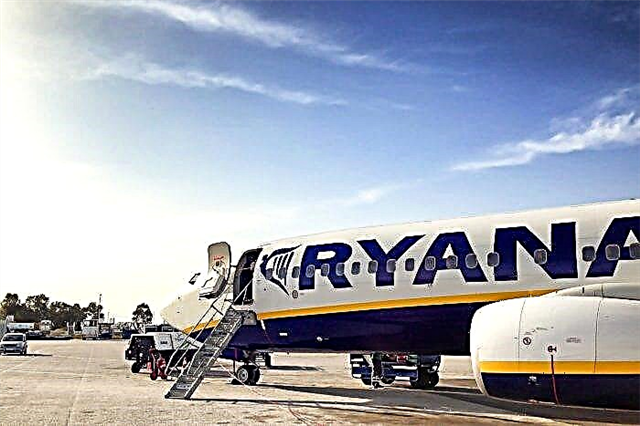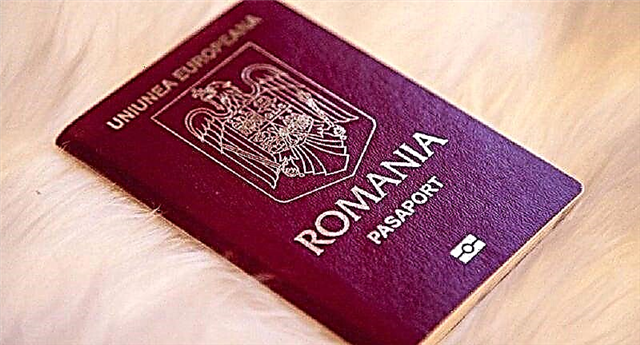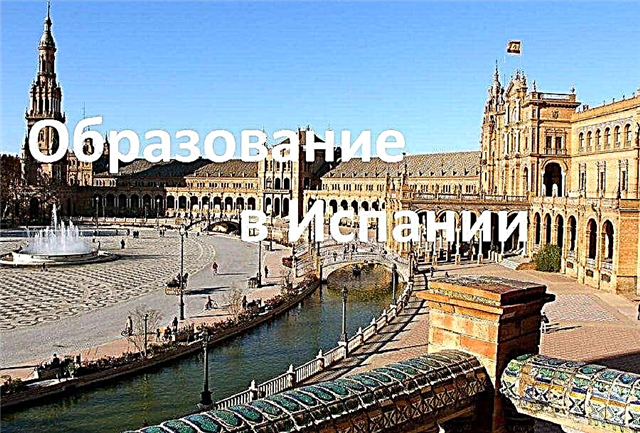The younger generation from Belarus, Kazakhstan, Russia, Ukraine is increasingly striving to get an education in Europe. Spanish universities are especially attractive for study. According to experts from the British company Quacquarelli Symonds, 3 Spanish universities entered the Top 50 educational institutions in the world. In total, about 50,000 foreign students, including Russians, study in the country.
The pluses of higher education in Spain also include:
- Affordable pricing policy. If you wish, you can actually find a course that costs 750 € per academic year;
- High quality educational services. In educational institutions, they provide a solid baggage of theoretical knowledge, promote an individual approach to each student, use the creative potential of the individual, musical and artistic abilities with maximum benefit;
- The third argument in favor of studying in Spain is often its functionality. With a bachelor's or master's degree, you can find a job in the EU countries, Russia and the CIS countries.
Features of the educational system
The education system in Spain consists of five stages:
- Preschool (Educación Infantil);
- Primary school (Educación Primaria) - compulsory for a child from 6 years old. Lasts 6 years;
- The intermediate level consists of the compulsory basic part of the Educación Secundaria Obligatoria and the additional training of the Bachillerato;
- The highest level (Educación superior) is represented in Spain by universities of three types: public, private and spiritual. In total, there are about 50 public and 10 private universities in the country. In many universities, there are medical faculties, where it is possible to receive a full-fledged education. In all categories of universities, education is paid, but those who wish can receive a grant or scholarship and study for free;
- Professional training. Such programs are offered by colleges, institutes, faculties of additional education at universities, higher schools, technical schools. Students and parents should understand that this is rather an analogue of the Russian secondary vocational education, college or technical school.

The structure of higher education
In Spain, higher education belongs to the pan-European Bologna system and branches into three parts:
- 1 step - Estudios de pregrado or bachelor's degree (grado) - training lasts 4 years, it is possible to obtain any specialty;
- Stage 2 - Estudios de postgrado or master's degree - the course lasts from one to two years. It is planned to acquire a narrow specialization and prepare for research activities;
- Stage 3 - Doctorado or graduate school - the course is similar to the Russian graduate school, lasts three years, provides for scientific activity and obtaining a doctoral degree.
Some higher schools have additional programs. They are called máster, experto o especialista universitario and are the second step. In fact, they are more consistent with refresher courses with a lot of practice. Lasts 1-2 years and includes a large number of hours of practical training. These courses are expensive, even in state universities, the cost of studying for a master remains very high.
Curricula and plans, pricing policy of universities are not controlled by the state - these issues are within the competence of the educational institution. The age of the applicant is of little interest to others and is limited by common sense. Before the age of 18, a young man is unlikely to receive a certificate, and after 40 it is irrational to study for a bachelor's degree, but it is quite possible to finish master's or master's courses. The academic year in Spanish universities begins on September 15 and ends on June 15.
Expert advice: Most foreigners prefer to get their education in a master's degree. They receive a bachelor's diploma at a domestic university, at the same time improve their Spanish and collect the necessary information about the prospects for further study. Then they apply for a master's degree to one of the Spanish high schools. Studying according to this scheme is cheaper and more conscious.
You May Also Like
Conditions of admission
For admission, you must submit a package of documents and pass the entrance tests in Spanish.
Subjects taken usually include:
- Spanish language;
- Foreign language (including Russian);
- Writing an essay;
- History or philosophy (at the choice of the applicant).
In addition to the compulsory subjects, the applicant passes four additional disciplines.
Please note: for all foreign students, a prerequisite is the translation of the school certificate or diploma into the state language and its notarization. To do this, you first need to contact the Spanish Ministry of Education.

In fact, there are not many conditions for foreign applicants. It is important that an applicant for study meets two points:
- Getting a secondary education at home. The proof of this will be a certificate of complete secondary education. Upon admission to the master's or postgraduate studies, bachelor's and master's degrees are presented, respectively;
- Good command of Spanish or English. For proof, it is enough to provide a certificate or pass the test directly at an educational institution.
Below is a list of certificates that are accepted by all universities in Spain. Passing scores depend on the requirements of the institution and the competition between applicants.
- Cambridge: level C;
- IELTS: 6;
- TOEFL CBT: 213;
- TOEFL IBT: 82;
- TOEFL PBT: 550.
List of required documents
For admission after the 11th grade of a Russian school, you need to prepare a package of documents:
- International passport;
- State certificate of complete secondary education. Only duly certified documents are accepted. Good marks in the certificate will add the chances of admission;
- Visa. It is enough for students to apply for a study visa;
- A motivation letter summarizing the reasons for the desire to study here.
You May Also Like
Additionally, the university can request documents at its discretion.

Passing trial tests
Selectividad (selectividad) or introductory tests in higher schools in Spain are held 2 times a year: in early June and early September. Accordingly, registration for testing begins in April or early July.
Samples consist of two blocks:
- The first part - four compulsory exams in specialized subjects;
- The second part - 2 additional exams for those wishing to increase the chances of admission.
Additional tests are highly recommended for students applying for:
- Faculties of Medicine;
- Legal specialties;
- Foreign languages;
- Control;
- Architecture.
All exams are conducted in Spanish.
Cost of education
In public universities, part of the training costs are borne by the budget, the amount of coverage is 75%, so you can often hear that education in Spain is budgetary. The student only has to pay a quarter of the cost.

The situation is different with private and religious institutions. Here education is completely paid, on average, the cost of training is 5 000€, in a public school you will have to pay for a similar course about 1,300 €.
Each Spanish university sets its own rates. The cost of the course is calculated as follows:
- Initially, the cost of 1 block of classes - ECTS-credit - is calculated (this is about 30 academic hours) for faculties, a system of benefits and a scale of calculations are prescribed. The price of one ECTS-credit varies from 12 to 30 €, depending on the university and the program;
- At the next stage, the student chooses the blocks of classes that he will attend in the academic year. The minimum bar is 30-35 credits per year, the standard amount is 60 blocks.If there is a desire to accelerate the study - there is an opportunity to choose even more blocks, if you want to extend the study for a larger number of years - they recruit the minimum number;
- After drawing up an individual program, it remains to multiply the cost of 1 ECTS-credit by the number of blocks, calculate the available benefits and reduction factors.
The cost of one year varies from 757 € at the Faculty of Tourism at the Universidades de Andalucia up to 14 730 € at the Faculty of Medicine of the University of Navarra. Prices shown are valid in 2021.
Is it possible to study for free
To get a free education in Spain, you need to try hard. First, applicants look for a preferential program or scholarship from a university. It is necessary to take into account the fact that applicants for one grant may be from 30 to 50 people. Therefore, if a future student does not fit the picture of an ideal scholarship holder, then it is worth taking a closer look at the budget education programs in public universities in Spain.

What grants and scholarships exist
You can start your search with the state programs of the Ministry of Foreign Affairs and the Agency for International Cooperation.
To get the desired result, you need to carefully study:
- Financing conditions;
- Obligations to return to Russia;
- A system of penalties, and do not rush to send a resume.
For example, the "Sandwich Program for 24 months" assumes that the first six months the student studies at home, the second semester in Spain, then returns to his homeland again. To act in a focused manner, experts advise choosing one or two programs and carefully preparing the necessary developments, resumes, and taking tests.
More information about grants and scholarships can be found here:
- Embassy of Spain in the Russian Federation, Moscow, Bolshaya Nikitskaya st., 50/8, [email protected] and www.educacion.es/exterior/ru
- Ministry of Education of Spain
- Carolina Foundation www.fundacioncarolina.es
- Detailed list of state scholarships (becas) www.boe.es

Accommodation and meals for students
Universities offer students dormitories, but the budget accommodation option is more appreciated - joint apartment rentals. Such housing is equipped with a kitchen, bathroom, hall. Each student has their own small room. Of the appliances, there must be a washing machine, microwave oven, TV. Eating in such conditions can be shared or individually.
The cost of renting housing will cost the following amounts (per month):
- Madrid and Barcelona - from 380 to 420 €;
- Salamanca and other non-capital cities - about 220 €;
- Jaen - from 170 €.
Top Universities in Spain
Most of the universities in Spain are public, each province has its own educational institutions. In Andalusia there are 10 state universities, in Castile - 9, of which 2 are private and 2 at the church, in Madrid –15, of which 6 are private and 1 spiritual.
The top three universities include world-famous educational institutions.
- The oldest university in Spain - Universidad de Barcelona (University of Barcelona). It opened in 1450, more than five hundred years ago. Over the years, almost 65,000 students have been educated in 16 faculties. www.ub.edu
- Polytechnic University of Catalonia (Universitat Politècnica de Catalunya). Every year we are ready to accept students of 53 specialties at the bachelor's degree, 119 - magistrate and 59 doctoral specialties. The institution conducts serious scientific work. The official website of the university: www.upc.edu
- Pompeu Fabra University (Universidad Pompeu Fabra) is a young ambitious university. It opened in 1990 and immediately claimed the title of the best university in Europe. The faculties of enterprise management and business administration, economics are considered prestigious. www.upf.edu
Student Reviews
Christina, 20 years old:I graduated from a Russian school (grade 11) and came with my mother to Spain. The translation and certification of the certificate cost me about 100 euros, I don't remember the exact figure. In order not to waste time while the documents were being certified, I went to FP (Formacion profecional). The selectividad exam was not easy at all. Studying after the Russian school is also difficult, especially in mathematics. I am now a student at the University of Seville.
Alisa Nabokova: I am from St. Petersburg, graduated from a Russian medical school and studied dentistry. I came to rest in Barcelona and fell in love with this city and country. My life has turned upside down. I studied the language for 6 months and lived on an exchange program with a Spanish family. During this time, I studied at several language schools, now I am studying at the ESERP business school (Barcelona), I am getting a second higher education with a degree in International Law. I am absolutely happy.
Kostya: It is difficult to survive in Spain without the help of parents. Formally, you can work four hours a day, but in real life it's not that simple. Decent work cannot be found, contracts are not concluded with foreign students in principle, earnings are small and unofficial. At first he worked part-time with translations and taught Russian. Now I managed to get a job in a small publishing house.
Going to study in Spain, a student receives a number of benefits:
- Saves money: in other European countries, higher education is more expensive.
- He is fluent in several foreign languages: a number of universities teach in Spanish and English.
- The result of training will be not only a baggage of theoretical and practical knowledge, but also a diploma, which is recognized by many countries of the world.











